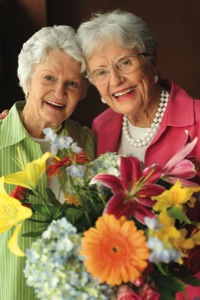
The set of The Golden Girls was a same-sex co-opt home for seniors. Of course Rose, Blanche, Sophia, Dorothy and their loyal fans never called it that, but in essence, it was. Inside this typical, suburban house in Miami, four senior citizens, without life partners, put their money together and lived their days surrounded by friends, fun and laughter and in the process they showed the world an alternative way to grow old.
While many may associate aging with canes, soft foods and dementia, the beloved characters of TheGolden Girls defeated the stigmas of old age. In times of ill health, these friends cared for each other and acted as a support system. In one particular episode, Rose even found an extended family in her roommates when dealing with the trauma of taking an HIV test.
Extend the concept of a same-sex, co-opt home for seniors a little bit farther and you’d get a viable solution to the 3 million gay and lesbian retirees who are currently suffering under the debilitating challenges of aging alone, amidst societal discrimination and without a community to look after them in time of need. It’s a subgroup in the LGBT community that hasn’t been much talked about, and due to ageism and delusions of unhampered longevity, isn’t much thought about either.
The issues not realized and unprepared for were brought to light in a senior needs assessment commissioned by The LGBT Center, set to be released next month. In a special preview given to San Diego LGBT Weekly, the assessment found graying men and women struggling with crippling issues that are unique to our community, such as isolation from family, inadequate healthcare, financial burdens and housing, all of which, according to the report, tend to be more challenging for gays and lesbians.
Most people in retirement struggle to maintain their finances, housing and good health, but because these troubles are tinged with discrimination, lack of research and go unaddressed, it is much harder for LGBT elders to overcome them.
The good news is The Center’s assessment is a part of a larger movement working to address these concerns. Now more than ever, LGBT seniors have opportunities to join social groups geared toward their lifestyle and educate themselves on how to deal with their future. This generation of seniors has more access to specialized programs than their predecessors, but more must be done to counteract the entire scale of challenges they face.
There are some pioneers who are advocating different ways to fill in the gaps of the current support system by promoting one that provides companionship, financial education, lifestyle-specific healthcare and affordable living. But before these ideas can gain any headway, people must first adjust their eyes to see this population that has been invisible for far too long.
Action follows awareness, and the time has come to address the needs of gay seniors now and the concerns of a younger generation who face the inevitable.
ISOLATION
Growing old means outliving family and friends. Many seniors find themselves without a life partner or group of friends to rely on for support. But what makes the loss of loved ones more detrimental to LGBT seniors is the lack of family support.
The Center’s assessment found that nearly two-thirds of the LGBT senior San Diegans surveyed said they could not be certain of having the support of children and family members, and this issue is “one of the most worrisome” to confront.
“Since the overwhelming majority of elder care in the U.S. is provided by family members, this leaves our LGBT seniors in a very vulnerable position,” wrote Amber Cyphers Stephens of The Center in an email.
LGBT seniors are twice as likely, 66 percent versus 33 percent, as the general population to be alone and experience isolation from family for many reasons. In particular, it’s due to the lack of parentage in the community.
In a 2008 study by Seniors Active in a Gay Environment (SAGE), which focuses on engaging LGBT seniors in the community, 90 percent of gay retirees have no children and nearly 80 percent are single. When their national counterparts can depend on the help of their adult children in times of need, LGBT seniors cannot.
To make matters worse, gay elders of this generation were born before homosexuality was openly discussed or accepted, and as a result, many have not come out of the closet to their families.
Dr. David Spak in San Diego, a senior citizen who researches the problems associated with gay aging, chose never to come out to his parents. But at the age of 16, his psychologist chose to out him to his father without his knowledge.
“My father hated me,” Spak said. “After he found out I was gay, he sent me on a train to an East coast prep school with a check. I haven’t seen him since.”
There is no guarantee newer generations of gay men and woman are immune to family discrimination and estrangement, and many are being forced back into the closet once they become dependent on unsupportive family members.
Mary Wynn, 64, resides in North County and was a representative of Proud Active Lesbians (PALS) which acted as a social support group for aging lesbians before it closed in 2008. In her experience, she has witnessed cases of lesbian seniors having to go back into the closet when they move home to live with their children.
“A friend of mine had to move back in with her daughter,” Wynn said. “But her daughter refused to let her visit with her partner because she disagreed with the relationship.”
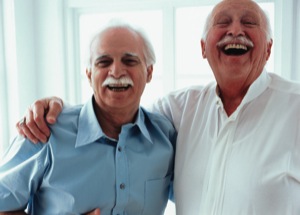
In the case Wynn described, the lesbian senior was forcibly isolated from her community, her partner and lost all connections to her previous life.
But even those still residing in their communities can face isolation.
“They’re called trolls,” said Dean Smith, president of SAGE. Ageism within the gay community exists, and many gay men dealing with wrinkles and impotence find themselves on the outskirts of a lifestyle that once welcomed them with open arms. In the case of lesbians, Wynn explained that women who have lost life partners don’t have access to social groups and don’t know how to reenter the community to meet like- minded lesbians.
“The gay community is very youth-oriented which makes the elderly gay or lesbian feel left out,” writes Jeffery Mingo in Defining and Promoting Older, Gay America. “Consequently, the gay and lesbian elderly confront a double whammy. They are marginalized in the gay and lesbian community for being old, and in the senior community for being gay.”
MAINTAIN GOOD HEALTH
According to The Center’s assessment, more than one-third of the seniors surveyed said they rely on Medicare and Medi-Cal for their healthcare needs. But those who are not fortunate enough to have an LGBT-friendly doctor who accepts Medicare/Medi-Cal are very reluctant to bring up specific health issues or even to be open about the basic facts of their lives. Patient silence often complicates the delivery of quality healthcare.
“There are still a lot of physicians and agencies that don’t acknowledge lesbians as having any other different issues,” Wynn said. “When you fill out forms at the doctor’s office, they ask if you’re single, married or divorced. They don’t ask if you have a domestic partner. They don’t acknowledge who you are.”
LGBT seniors are half as likely to have health insurance coverage as their straight counterparts, according to the Williams Institute, and many are without access to LGBT-friendly doctors. Because of this, they tend to keep their sexual orientation to themselves, and so do not receive adequate healthcare.
Lesbians in particular have gynecological factors that differ from straight women. It is rare for lesbians to have cervical cancer and they do not require pap smears.
“If you don’t have the right doctor, none of that is acknowledged,” Wynn said.
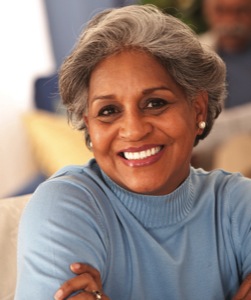
For LGBT seniors in long-term care facilities, many find the nurses and doctors available to them are not trained to be aware of the special health concerns their community deals with, and only 13 percent of facilities in the county include sensitivity training on sexual orientation, according to a survey conducted by SAGE’s Long Term Care Task Force.
This can be devastating for gays older than 50 who now make up the fastest-growing population of those living with HIV. According to AIDS Community Research Initiative of America (ACRIA), 35 percent of people with HIV are 50 and older and 70 percent are older than 40.
And in a time of illness, gay men and lesbian women find themselves dying in hospitals alone. If LGBT patients do not specify in writing who they wish to see them off into the next life, ICU’s will only allow blood relatives into the hospital room. And if one partner is forced to enter into a nursing home, Medicaid provisions do not allow the other to stay in the couple’s home. But this is just one of the many legalities affecting gay seniors.
FINANCIAL HARDSHIP
Anyone can be plagued by financial hardship if they are retiring in this economy. But gay men and lesbian women need to be extra prepared for this phase of their life – more so than their straight counterparts. Currently 80 percent of LGBTs cannot afford to retire.
Spak and his life partner co-signed for everything. Their cars and home were all shared property. But at the time of Spak’s partner’s death, his partner’s family inherited everything. Spak was left without a home or the Mercedes-Benz they both had worked so hard for. Not only material possessions, but Spak wasn’t eligible to receive any of his partner’s benefits, such as social security income, pension or life insurance. And Spak is not an isolated case.
“One half, or 51 percent of all LGBT baby boomers have yet to complete their will, living will or other similar legal directive despite the fact that LGBT couples and families currently lack legal protection,” said the MetLife report on lesbian and gay baby boomers.
While inheritance and tax laws protect opposite-sex spouses, these do not apply to life partners. LGBT couples must prepare for the inevitable now if they are to protect their loved ones from financial hardships.
This can be done by involving a durable financial power of attorney if they want their partners to take over the financial issues while they are incapacitated. Involving a health care power of attorney will also ensure partners have control over one another’s life decisions in the hospital. The tools will give partners priority over biological family.
Lastly, LGBT seniors need to have a will or living will. Without clear specifications of where they want their property to go, it can be taken by the biological family or the state, leaving a life partner with not even so much as a home.
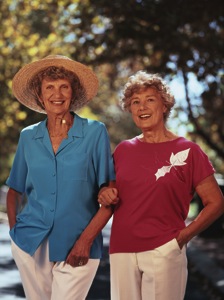
HOUSING
Not having housing is the end result of all the previous issues put together. As of now, there are limited places where aging gay men and lesbian women can go to live affordably, surrounded by companions, with access to adequate healthcare.
Due to financial hardship, many LGBTs do not have homes, but small apartments, increasing their isolation. Housing is a key in addressing all these issues at once. Yet it is the most unpursued of solutions.
“When the time comes to transition (from home to a care facility) due to declining health or the fact that they no longer want to maintain a home,” Spak said, “there’s almost nowhere to go except mainstream facilities.”
These facilities can be gay-friendly, but the reality is there will be an overwhelming majority of straight seniors in them, leaving LGBTs isolated and indirectly discriminated against.
“If we had our own facility, we could live more comfortably, we could be ourselves,” said SAGE President Smith. “In mainstream facilities, it can be like living in a prison.”
In 2006, MSNBC reported on a story in San Francisco where an elderly lesbian couple was housed on separate floors of a nursing home and kept from seeing each other. Other stories of discrimination in mainstream facilities are not as direct, but because of the silent pressure coming from the majority of straights, many gays choose to keep their sexual orientation a secret, rather than risk being ostracized. In other words, they are forced to go back into the closet.
Bill Chapman, co-founder of Fellowship of Older Gays (FOG) in San Diego advocates San Diego services like Elder Care, which partners with The Center in placing seniors and has gay-friendly programs and services. Yet he finds the idea of retirement homes specific to the needs of LGBTs to be a desirable option.
“I think there is a need for a gay retirement home in San Diego,” Chapman said. “Most gay people like to be around other gays, even in a nursing home.”
Currently, there is only one continuing care retirement center for LGBTs in the country, and it is still under construction. Out of hundreds of centers that provide levels of care for active seniors and those in need of assisted living, LGBT seniors have only four.
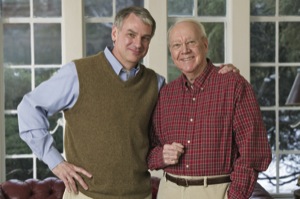
There are gay-friendly retirement homes in service right now, such as Rainbow Vision Santa Fe in Santa Fe, New Mexico, that offers both active and assisted living. But to make these ventures profitable, investors must charge exorbitant prices or risk just barely breaking even. The buy-in costs for these luxurious retirement homes ranges from $300,000 to $500,000, followed by monthly fees that can be anywhere from $3,000 and upwards. This is not a viable alternative for aging seniors since most, even after selling off all their assets, will not be able to afford these facilities.
Spak is determined to provide something in San Diego within the next couple of years, but unlike a retirement facility, he is interested in starting a new trend of affordable, gay, senior living: gay co-opts. Spak intends to buy a luxurious home in Del Mar, and charge affordable buy-ins and monthly fees.
“I warmly invite four or five gay men to come together and live as an extended family,” Spak writes. In the two-level home, one for active living and one for assisted, Spak will try to tackle isolation, healthcare problems and financial hardship all in one solution. He does not intend to make profit off the home, but is hoping to show others viable alternatives to aging gay.
“I want this to catch on,” he said. “But first people need to see it happen. Think Golden Girls! It’s the same concept!”
In the meantime, The Center’s 50 and Better program offers social, educational and recreational activities and opportunities for LGBT community members 50 and older. There are also a host of senior groups that offer movie nights, discussion groups, potlucks and outings right here in San Diego. PrimeTimers and FOG are specific to gay men, while SAGE along with The Center is open to LGBTs. For more information on these groups, visit thecentersd.org/socialclubs.php.
“The main thing is to stay active,” Smith of SAGE said. “You have to get out of the house!”
Chapman of FOG recommends particular Hillcrest/North Park hubs that are LGBT senior-friendly, such as #1 Fifth Ave., Caliph Bar and Pecs Bar, which all bring in a sizeable number of mature LGBTs as well as a younger crowd, too.












This is a crucial issue. It’s not all about the flashy headline items: marriage, domestic equality, etc. What good are those things if at the end of life, none of it means anything? Okay, marriage is a big step in the right direction… assuming you live in a state that recognizes it.
How much of the problem faced by “trolls” is self-inflicted? Let’s face it: ours is a community obsessed with youth. THAT’S the place we need to start change. WE OURSELVES need to start accepting the older members of our family before we can ever expect anyone else to accept us.
Thanks for this very comprehensive article on older glbt people-of which I am one. The proof that our community/movmeent is maturing is that we now are able to have resources for different parts of our community-young people, old people, people with legal issues, religious issues, etc. We need to get people to use such resources as are listed in Gayellow Pages-the national one, and local glbt yellow pages. While many people do know of PFLAG, they also need to know of COLAGE, GLSEN, SAGE, The Point Foundation, etc. And such services as the lgbt living place in Hollywood-Triangle Square (for older people with low-income) as well as retirement places for glbt people such as are now in Palm Springs and Santa Fe, etc.
But older people need to also do their part when able and support local work; they are needed in local political work, religious work, and local glbt centers.
First I want to thank Ms. Rodriguez for writing about an issue that’s timely and very important. However, even though she used the acronym “LGBT” the article, like SO many before written by many, speaks almost exclusively about “lesbians and gays”. Please remember that there are also transgendered/gender variant people who face the same issues and, in most cases, the discrimination is even more vehement and violent. While it is true that there are lesbians who are also transgendered and gays who are also transgendered, not ALL transgendered people are lesbian or gay…some of us are heterosexual or bisexual or asexual. What makes this important is that communities/homes/facilities for “same-sex couples” are not open to transfolk who are not in a “same-sex” relationships. And yet they face the same equally damaging, and sometimes deadly, discriminatory practices as those who are in same-sex relationships. We all need the safety and security of acceptance, comfortable and safe housing, medical care and companionship especially as we age past our own ability to care for ourselves…please don’t forget the rest of us in the LGBT acronym.
This is a great article. As a 56-year-old gay man living in San Francisco, my life has changed a lot since I moved in here in 1976 and I’ve pretty much become “invisible” within the gay community. I spent a lot of my 20’s and 30’s fighting for gay rights, and now the 20 and 30 year-olds I encounter seem to have no awareness that a lot of the freedoms they take for granted we struggled for. If I walk into a bar and attempt to have a conversation with someone younger, I’m immediately ostracised because they think I’m trying to hit on them. I agree with Robyn that this is an issue that exists completely within our community, and there still seems to be a great deal of fear re: aging that verges on narcissism. I also want to encourage other elderly gay people to “take back the streets” and become more visible in the community; I know many gay people that have bought into the concept that they’re now “worthless” because they’ve gotten older and rarely leave their homes.